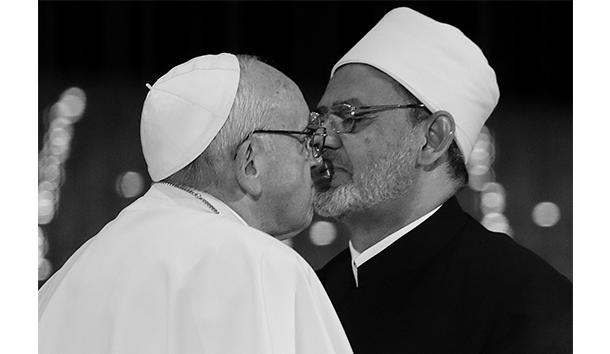Pope Francis, the first Pontiff to visit the Arabian Peninsula, attended a hugely publicized interfaith meeting in the United Arab Emirates on February 4 as part of what the Vatican described as his “outreach to the Muslim world.” The following day he held an open-air Mass in Abu Dhabi, attended by 135,000 Catholic guest workers who are normally not allowed any public display of their faith.
The Pontiff’s address to the Muslim Council of Elders, a body set up by the UAE supposedly “to counter religious fanaticism by promoting a moderate brand of Islam,” was a melange of p.c. platitudes, banal and embarrassing in equal measure. He urged religious leaders to reject the “miserable crudeness” of war and called on religions to come together to resist the “logic of armed power . . . the arming of borders, the raising of walls.”
“There is no alternative: We will either build the future together or there will not be a future,” he continued. “God is with those who seek peace.”
The “Council of Elders” which Francis addressed is the brainchild of Sheikh Ahmed al-Tayeb, the grand imam of Cairo’s Al-Azhar mosque and university. This was the fifth meeting between Francis and Tayeb. It finally ended Al-Azhar’s freeze in relations with the Holy See, which followed Pope Benedict XVI’s 2006 comments on Islam and violence and his subsequent demand for greater protection for Christians in Egypt.
Sheikh Tayeb is routinely described by Western media and academia as a “leading moderate” and “a strong proponent of interfaith dialogue.” In 2016 Pope Francis even claimed that his meeting with Tayeb at the Vatican was proof that Muslims “seek peace, encounter.” In his Egyptian TV sermons, however, the good sheikh presents a very different face to the faithful. He approvingly uses a radical phrase “the faith and the polity,” which affirms that Islam is both a religion and an ideological blueprint for governance that is anti-infidel at its essence. He firmly asserts that a Muslim apostate “must either renounce his apostasy or else be killed.” Three years ago, when asked why Al-Azhar refused to issue a formal statement denouncing the Islamic State as lapsing into kufr (unbelief), Tayeb responded, “Al-Azhar cannot accuse any Muslim of being a kafir as long as he believes in Allah and the Last Day, even if he commits every atrocity. . . . I cannot denounce ISIS as un-Islamic.”
Tayeb’s hypocrisy has prompted the Cairo Institute for Human Rights to accuse Al-Azhar of having two faces: one directed at the West, another at Muslims. Sheikh Muhammad Abdullah Nasr, an Al-Azhar graduate who has parted ways with Tayeb, concluded that the Islamic State itself is a byproduct of Al-Azhar’s programs, which preach the establishment of the caliphate, hostility toward religious minorities, upholding the jizya (poll tax for “infidels”), and stoning sexual transgressors. At the same time, Tayeb insists that Europe “must support all moderate Islamic institutions that adopt the Al-Azhar curriculum.” He wilfully turns a blind eye to the unceasing persecution of Coptic Christians, asserting that “Egypt represents the ultimate and highest example of national unity” between Muslims and Christians.
At the end of the interfaith meeting on February 4, Francis and Tayeb signed an awkward statement affirming “human fraternity” and their hopes for world peace, in the name of “all victims of wars, persecution and injustice . . . and those tortured in any part of the world without distinction.” Tayeb used the occasion to stress to the audience that Islam is a “religion of peace that values human life” and that “all religions are innocent and free from terrorism.” Francis smiled and nodded, approvingly.
Pope Francis’s Arabian tour was a major victory for Tayeb and his ilk, made possible by the fact that the Pontiff’s understanding of Islam is deeply problematic. His claim that “authentic Islam and the proper reading of the Koran are opposed to every form of violence” is a statement both willfully self-deceptive and demonstrably false. Yet he appears reluctant to address the persecution of Christians in Muslim countries, even though it is the most egregious example of human right violations in today’s world. Aid to the Church in Need, in its latest Religious Freedom Report, warns that 327 million Christians—overwhelmingly in majority-Muslim countries—live where they are subjected to violence, making Christianity “the most persecuted religion in the world.”
Seemingly indifferent to the plight of persecuted Christians in the Middle East, Francis is simultaneously supportive of the ongoing Islamization of Europe, as evidenced by his emphatic encouragement of mass migration and condemnation of any resistance to it as sinful. Whether he truly believes the myth that Islam is a religion of peace, or he hopes that appeasement may help create a more moderate Islam, is irrelevant. As William Kilpatrick has warned recently, Francis “is taking a huge gamble—not only with his own life, but with the lives of millions.”
Today’s Muslims—like their ancestors—invariably sympathize with fellow Muslims when facing “the Other,” which produces a vision of world affairs in which Muslim polities are always victims, always innocent. Continued appeasement can only encourage Tayeb et al. to hone their skills at playing at “dialogue” while resorting to lies and deception in pursuit of dominance.
It is understandable that Pope Francis and a legion of other woolly-headed Western liberals would like to have a reformed, friendly Islam as our global neighbor. Alas, Islam’s ability to reform itself—weak to start with—is further undermined by Western elites’ consistent appeasement of raw, unrepentant Islamic traditionalism. Not only is this contrary to the American interest; it is a threat to the survival of European civilization, as it faces yet another existential trial of demographic and moral strength from the followers of Muhammad’s peculiar creed.

Leave a Reply